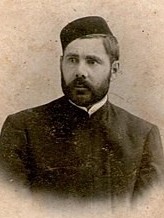
Shakir Rameev was born in March 5, 1857 in the family of a Tatar merchant in Zirgan village, Sterlitamak district, Orenburg province. His parents are Muhammetsadyk Rameev (1829-1892) and Hanifa Dashkova (1825-1896), brother – Muhammetzakir Rameev.
His family moved to Yuluk village, Orsk district, Orenburg province in 1862. He received his primary education in Yuluk village, later he studied at the Damella Garif Maazi madrasah in Orsk, and with Abdullah bin Said in Mullakaevo village. He studied Russian and, according to Tatar teacher and educator Fatih Karimi, he spoke Arabic fluently.
He lived in the Sultan and Adelshah mines from 1883 to 1900, in the Balkan mine of the Verkhneuralsk district since 1900 and in Orenburg in winters. In 1890-1900, the Rameev brothers took over their parents’ gold mines in the Orsk district, where they washed and handed over more than 5 tons of gold to the state. By the beginning of the twentieth century, they had expanded their father’s business to include more than 30 gold mines in the Southern Urals. 850 people were employed in their mines. Having visited Western Europe in 1902, Shakir Rameev got acquainted with new methods of gold mining, purchased modern equipment, which, thanks to his experience and engineering skills, he adapted to the working conditions at his mines. He made a proposal to improve the assembly for washing gold.
Rizaeddin Fakhreddin wrote about him: “Shakir afendi had a gentle nature, enjoyed helping others and charity. He was naturally generous, helped personally, spent a lot on public affairs, for the benefit of religion and the nation. He was indifferent to fame, that is why many of his deeds remained unknown to the public”.
Shakir Rameev is a well-known public figure. In Orenburg, he co-founded with his younger brother Muhammetzakir a liberal Muslim newspaper “Waqyt” (Time, 1906-1918, editor Fatih Karimi) and the Shura magazine (Council, 1908-1917, editor Rizaeddin Fakhreddin). He was an honorary member of the Orenburg, Sol-Iletsk, St. Petersburg, and Yalta charitable societies. Supported the construction of mosques and madrasahs, dozens of educational institutions for Tatars, paid for the studies of Tatar shakirds and students studying in higher educational institutions, including those abroad, and published books written by Tatar authors.
In 1899, he traveled throughout Europe. He studied publishing in the printing houses of St. Petersburg, Moscow and Western Europe.
In 1900, he provided financial assistance to Gilman Akhund in the establishment of an Orenburg printing house.
In 1909, the Rameev brothers opened their own printing house named Waqyt, the best equipped among the Tatar printing houses.
According to Rizaeddin Fakhreddin, at the end of his life he suffered from a nervous breakdown. In March 12, 1912, he left Orenburg with the intention of consulting doctors and then traveling to the Crimea or abroad for treatment. His wife Gauhar and brother Muhammetzakir accompanied him. At the Voskresenskoye station near Moscow, he fell off the train and fell under the wheels of a carriage.
He died in March 15, 1912, and was buried in the Orenburg Muslim cemetery.
